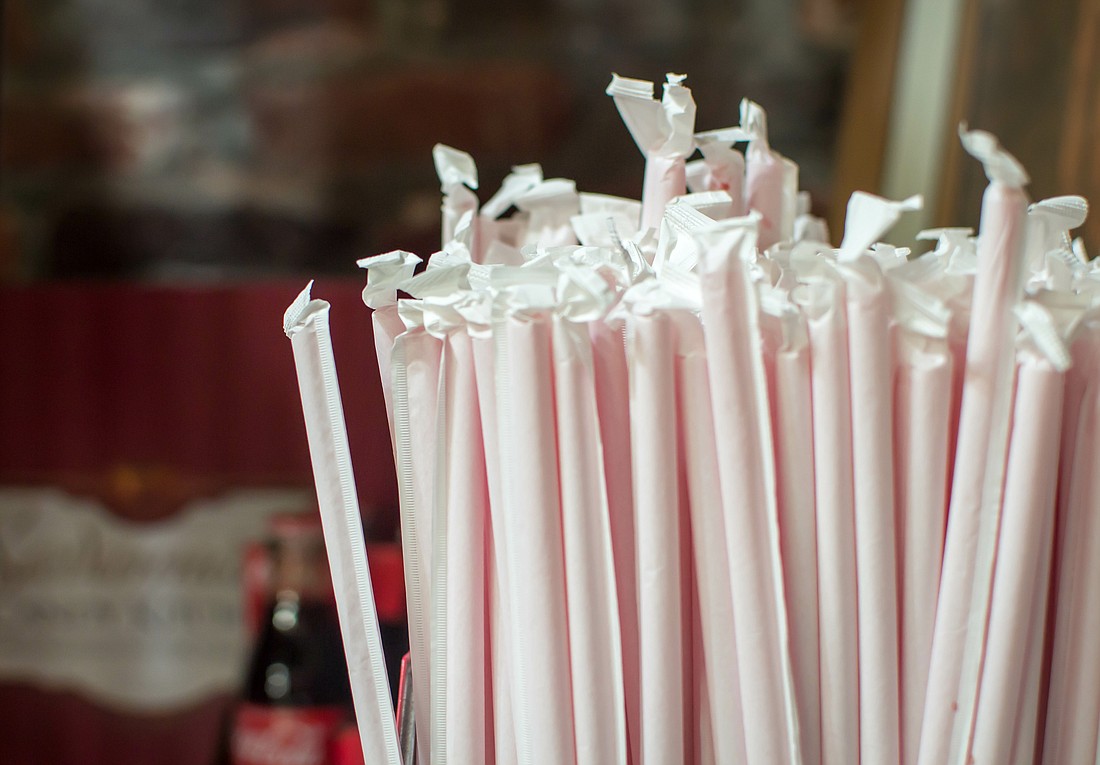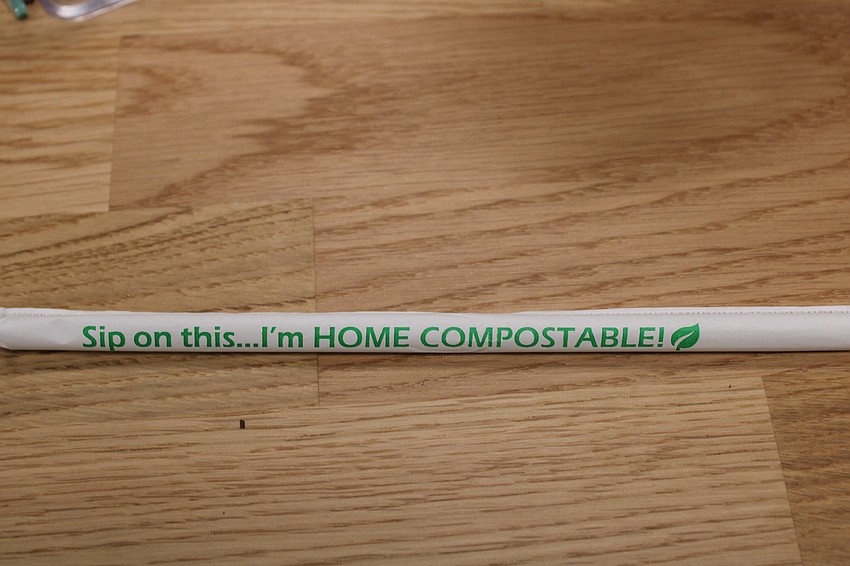- December 13, 2025

Each year, 11 million metric tons of plastic enter the world's oceans, compounding the 200 million-metric-ton problem that already exists, according to a statistic by the Ocean Conservancy.
As part of its Fighting for Trash Free Seas initiative, the nonprofit group reports that plastic has been found in over 60% of all seabirds and in 100% of sea turtle species, all who mistake plastic for food. And if nothing is done to reverse plastic production and consumption — which Ocean Conservancy states is predicted to double in the next decade, humans could be the reason for 300 million metric tons of plastics in the world's oceans in less than 10 years.
In 2019, the city of Ormond Beach adopted an educational plastic straw ban, an effort spearheaded by City Commissioner Susan Persis to reduce the use of single-use plastics in the city.
And then, the COVID-19 pandemic hit, and restaurants experienced a significant financial impact. Those that had switched, or were in the process to switch to compostable or biodegradable straws, suddenly were faced with a more prominent issue — how to stay open.
"Disposable plastic straws cost less than a penny," Persis said. "But you compare with compostable plastic straws which are biodegradable and plant-based, those cost about 4 cents each, while paper straws are about 6 cents each and reusable glass straws cost between 50 and 60 cents."

The issue impacted more than straws. Local restaurants did not have the funds to continue to purchase non-plastic items, and the overall movement to reduce single-use plastics seemed to reach an end, said Dream Green Volusia Founder Suzanne Scheiber.
“A ketchup bottle can be less expensive than a whole box of ketchup packets,” Scheiber said.
It's been almost four years since the city's educational straw ban was approved. With this in mind, the Observer reached out to a sample size of local restaurants and cafes to determine how many still offered an eco-friendly straw option in a post-pandemic world.
We surveyed 26 restaurants within the city's downtown district (which spans Granada Boulevard from A1A to Orchard Street), excluding fast food and large chain establishments. Of the 26, only seven currently offer a non-plastic straw option. Of those seven, five are located on the beachside.
Persis said it's time to start talking about reducing the use of plastics again.
"It's not going to happen overnight," Persis said. "It's impossible for it to happen overnight, but I think we need to celebrate the successes."
Solberry Bowls, which opened in March, is among the six restaurants that offer a non-plastic straw option. Owners Jessi McClary and her fiancé Sean Azari have big plans for Solberry, one of them being the environment.
“When you own a business, you want to sell a lot of whatever it is that you are selling, and I just didn’t have it in my heart to sell things that weren’t eco-friendly,” McClary said.
Solberry offers build-your-own açai bowls and smoothies. With the shop needing different types of containers for its offerings, McClary and Azari decided it was best to use eco-friendly straws and containers.
“The straws we use are home compostable PHA, meaning that it was tested to be able to be placed straight into your garden,” McClary said. “The other plastics have to be composted at a facility properly, but are still eco-friendly.”
These plant-based straws are made out of a compostable and marine-degradable bio-polymer, which gives the feeling of a plastic straw. They can be commercially composted in three months, degrade in the ocean in six months or be composted at home in one year.
“It’s our planet," McClary said. "I don’t want to leave a bad planet for my children or other kids."
Prior to COVID-19, Scheiber had a restaurant recognition program for Volusia County through Dream Green Volusia. Scheiber and her team would meet with restaurants to assess their usage of plastic items, such as straws, containers and silverware.
Each restaurant was then rated through criteria involving how many plastic items were able to be replaced with a more environmentally-friendly option.
I do think Ormond Beach cares, for sure, and I think Earth Day is a perfect time to start reflecting on what we can do to help our environment right here in our city, and hopefully, it'll spread." — Susan Persis, Ormond Beach City Commissioner
Dream Green Volusia stopped the program at the start of the COVID-19 pandemic as the supply chain was interrupted.
“A lot of plastic replacements are made in China and production stopped,” Scheiber said.
Oftentimes, restaurants solely utilize plastic options, such as straws, stirrers and cups because they are the affordable option.
“We live in a tough world where corporations are trying to save themselves money, and I'm referring specifically to plastics,” Scheiber said. “It's cheaper to make new plastic than it is to recycle plastic, so we're ending up in this vicious cycle of more and more and more.”
The most effective approach Dream Green Volusia could take to stay proactive on the single-use plastic battle was advocating for the county to create an anti-litter campaign to focus on the cleaning of discarded trash items over the county, especially removing littered cigarette butts.
It's cheaper to make new plastic than it is to recycle plastic, so we're ending up in this vicious cycle of more and more and more.” — Suzanne Scheiber, founder of Dream Green Volusia
Every restaurant can't simply eliminate single-use plastics immediately, Persis said, and she doesn't think any of them want to intentionally harm the environment.
"I do think Ormond Beach cares, for sure, and I think Earth Day is a perfect time to start reflecting on what we can do to help our environment right here in our city, and hopefully, it'll spread," Persis said.
And it begins at the individual level, she said. Plastic bags can be recycled at places like Publix and Walmart. If you forget your reusable shopping bags, ask for paper bags at groceries stores that offer them. When eating at restaurants, consider if a straw is really needed. If buying plastic water bottles, see if biodegradable ones are an option.
"Look at different options instead of just keep doing the same thing," Persis said. "Because if you keep doing what you're doing, you're going to keep getting what you've got if you don't change. Those are the things we do in our house."
It’s our planet. I don’t want to leave a bad planet for my children or other kids." — Jessi McClary, Solberry Bowls
A full straw ban didn't pass in the city in 2019, and Persis said that's likely because there was a concern about impacting the hospital industry or individuals who do need plastic straws for medical reasons.
But when she hears the statistic that there will be more plastic than fish in the world's oceans by 2050, Persis said it only stresses the need to reduce the use single-use plastics and styrofoam. When she attends conferences and meetings with other officials, the topic of plastic pollution does tend to come up.
"It is a concern for all cities and it's just educating, prioritizing and hopefully, people will listen and change some of their habits," she said.
This story was updated at 8:50 a.m. on Tuesday, April 25, to include the survey results from one restaurant on the mainland, which responded after this story's original publication date.